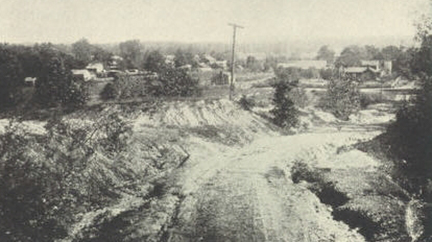
“Down by the Green River, where Paradise Lay.” A riverboat on the Green River circa 1900. Credit: The Ancestors of Robert Stom & Christine (Hilton) Stom. Front page: Downtown Paradise, Ky., circa 1898. Credit: Wikimedia Commons
By Maria Maring
After the passing of legendary folk singer/songwriter John Prine in April 2020, I found myself revisiting his songs in memoriam. Prine’s music was the soundtrack of my childhood. My entire family are musicians, and they played Prine classics like “Long Monday” and “Angel from Montgomery” at every family gathering. Now, as a young adult and aspiring environmentalist, I’ve discovered new meaning in his lyrics: profound ecological consciousness.
“Paradise,” from his 1971 self-titled debut album, particularly caught my attention. In the song, Prine expresses a deep longing to revisit a fond place from his youth — Muhlenburg County, Kentucky — only to be informed that the whole town has been demolished for mining operations.
John Prine’s self-titled debut album cover from 1971. Credit: Wikimedia Commons
… Then the coal company came with the world’s largest shovel,
And they tortured the timber and stripped all the land.
Well, they dug for the coal ’til the land was forsaken.
Then they wrote it all down as the progress of man.
“And daddy, won’t you take me back to Muhlenberg County,
Down by the Green River where Paradise lay?”
“Well, I’m sorry my son, but you’re too late in asking:
Mr. Peabody’s coal train has hauled it away.”
This 1971 song describes what would be coined in 2003 as solastalgia. A combination of the words “solace” and “nostalgia,” solastalgia is the distress one feels at environmental degradation of one’s home place. Although the term has existed for less than two decades, the feeling of solastalgia has been around for much longer, and its tendrils have quietly crept around the globe. Too often, climate change is regarded strictly as an ecological, economic, or human rights issue; we have been slow to acknowledge that it also has emotional implications. The effects of climate change are hitting closer and closer to home. While many of us have come to expect the ecological consequences of climate change, very few of us have begun to acknowledge, much less openly discuss, its impact on mental health and emotional well-being.
Over the years, Prine’s lyrics have taught us that emotions are beautiful and necessary, even in the realm of environmentalism. To move forward as a climate activist, I must first feel the emotional toll of the drastic changes happening to our homelands.

The Bucyrus Erie 3850-B Power Shovel in Muhlenburg County, 1962. Note the bus for scale. Source: MichaelBNA via Wikimedia Commons
Prine was writing about very real experiences in “Paradise.” The song refers not necessarily to an imaginary paradise-like place, but to an actual small town in Muhlenberg County that sat on the banks of the Green River. And the Peabody Coal Co., now known as Peabody Energy, really did conduct mass strip mining operations in Paradise, as well as across Kentucky and other Midwestern states. Furthermore, “the world’s largest shovel” was no metaphor; it referenced the Bucyrus Erie 3850-B Power Shovel, which lumbered into Paradise in 1962.
When the song debuted in 1971, Prine’s lyrics immediately caused outrage at Peabody, and the controversy persists today. In 1973, the company published a fiery rebuttal to the song, titled “Facts vs. Prine.” And during a lawsuit 40 years later involving the wrongful arrest of environmental demonstrators, Peabody requested that Prine’s lyrics finally be struck down for tarnishing its name. That request was denied.
Today, Paradise no longer exists. Strip mining polluted the land, water, and air, leading to outbreaks of cancer and heart disease. The town was abandoned in 1967, its destitute residents forced to begin new lives elsewhere. All of the town’s buildings were bulldozed and replaced by the Tennessee Valley Authority Fossil Plant, the largest coal power plant in the world at that time. That facility was retired in February 2020 due to noncompliance with the Clean Air Act. All that remains today is the Paradise Cemetery.
Prine’s story is merely one example of the environmental atrocities that have destroyed beloved places and driven people from their homes. There are lost paradises all over the world. For example, the 2018 climate change-driven “Camp Fire” destroyed Paradise, Calif.
Glenn Albrecht, Professor of Sustainability at Murdoch University in Western Australia, has long investigated the connection between mental illness and environmental degradation. It was after studying areas affected by strip mining and interviewing displaced inhabitants that Albrecht coined the term solastalgia. In the paper that introduced his term to the world, he concluded:
There are complex relationships between environmental or ecosystem stressors and human distress. … A psychoterratic (related to the earth) syndrome such as solastalgia captures the essence of the relationship between ecosystem health, human health and control (hopelessness and powerlessness) and negative psychological outcomes. While the preliminary research on mining … has produced promising new insights into psychoterratic illness, there are many more environmental contexts where chronic environmental stressors negatively affect human health and wellbeing. Climate change (will) be a globally significant source of psychoterratic distress expressed as nostalgia and solastalgia.
In 2020, we witnessed a multitude of these chronic environmental stressors — and likely, a host of unnamed psychoterratic syndromes. For example, wildfires uncontrollably raged in the West, while hurricanes relentlessly demolished eastern communities. In total more than 9,900 fires burned over 4.2 million acres in California. Meanwhile, Louisiana residents have been losing hope for their flood-drenched coastal homes, many surrendering and moving inland after Hurricane Laura. Events like these will become normalized in our changing climate; the degradation of more paradises is impending.
As climate change continues, solastalgia will become more widespread, and we must acknowledge it. Although there may be no steadfast cure for environmental distress, the first step to approaching any issue is recognizing its existence. As we take steps to mitigate and adapt to global changes, it is imperative that we also allow ourselves the time and space necessary to process these changes. Staring climate change in the face is no easy feat.
Arguably the most inspiring solastalgia-recovery story is famous Swedish climate activist Greta Thunberg. At 11 years old, Thunberg watched a video about the bleak effects of climate change, featuring starving polar bears and severe weather events. Thunberg was so intensely affected, knowing that her home country would not be excluded from such horrors, that she fell into a deep depression. She stopped speaking and even eating, weakened nearly to the point of hospitalization. Yet, out of this depression emerged the relentless Greta we know today. One Friday afternoon, she sat on the steps of Swedish Parliament with a sign that read “School Strike for Climate.” Although she protested alone on Day 1, she has mobilized millions in one of the largest political movements sweeping the globe. Thunberg told Time Magazine in her 2019 Person of the Year interview: “Learning about climate change triggered my depression in the first place. But it was also what got me out of my depression, because there were things I could do to improve the situation. I don’t have time to be depressed anymore.”
As with all issues that affect our mental well-being, we will cope with climate change in numerous unique ways. Greta channeled her solastalgia into activism, quickly becoming the face of the environmental movement. Prine used his songwriting gifts to cope with solastalgia, which brought national attention to strip mining’s devastation. My own avenue for solastalgic expression is writing.

“Paradise and the Highway Thereto.” Credit: The Ancestors of Robert Stom & Christine (Hilton) Stom
I have witnessed ongoing damage to my home environment of Southern Illinois. Fall and spring now span only a couple of weeks, giving way to more intense summers and winters. The white noise of humming insects and singing birds has largely faded over the past decade as their populations plummet on a local and global scale; the retired farmstead that I call home is now dead quiet. An otherwise healthy individual, I have developed asthma as a result of declining air quality. The streams, rivers, and lakes I’ve been romping in since I was a kid — Hutchins Creek, Cedar Lake, and others — are now tainted green and orange due to nitrogen runoff from agricultural fields and coal ash from leaky mines, respectively. Both prairie and forest ecosystems have been demolished for housing units and strip malls. Our uniquely hilly and biodiverse Southern Illinois lands have been reduced to parking lots and artificial grass. More frequent flooding from the Ohio, Mississippi, and Big Muddy rivers have cursed local farmers, ravaging local economies and food systems. My community and I are forced to reckon with these myriad symptoms of climate change just as communities around the globe reckon with theirs.
In every piece I write, I contemplate the effects of environmental degradation, thoroughly dissect how I feel about it, and synthesize those feelings carefully. Everyone has an individual responsibility to contribute to collective climate action, so I write to implore others to make small changes in their life or start a climate conversation with their friends and family.
I also write to say this: It is OK to be angry and sad and confused about the state of the world. It is only when we acknowledge our solastalgia that we can act upon it, striving toward a more sustainable home, community, and world. For one person, coping with solastalgia might manifest as joining an environmental organization; for another, keeping a weather journal. For someone else, it might mean showing up to the polls.
As the last verse of “Paradise” requested, John Prine’s ashes were spread on the Green River after he passed on April 7, 2020. While we mourn his loss, we are also mourning the slow death of our homes. Let us not ignore this mounting grief; let’s turn the pain of solastalgia into personal songs of climate action.
EDITOR’S NOTE: You may view a video of Prine playing “Paradise” on Season 3, Episode 17 of Bobby Bare and Friends, a talk show that hosted country and folk musicians for performances and interviews from 1983 to 1988. The author’s uncle, Robert Bowlin, was the fiddle player for Bare’s house band at the time. Mr. Bowlin plays a lovely solo in this version of “Paradise.”
View the video on YouTube at https://www.youtube.com/watch?v=HDEjL3_j2XU.
About the Author …
 Maria Maring is a junior from Carbondale, Ill. She is double-majoring in Earth, Society, and Environmental Sustainability and Spanish, with a minor in National Resource Conservation. She is also pursuing the Certificate in Environmental Writing and works as a Communications Intern with the Institute for Sustainability, Energy, and Environment (iSEE).
Maria Maring is a junior from Carbondale, Ill. She is double-majoring in Earth, Society, and Environmental Sustainability and Spanish, with a minor in National Resource Conservation. She is also pursuing the Certificate in Environmental Writing and works as a Communications Intern with the Institute for Sustainability, Energy, and Environment (iSEE).
This article is the 2020 Janelle Joseph Environmental Writing Contest prize-winner in the Memoir category.
WORKS CITED
https://www.bbc.com/future/article/20151030-have-you-ever-felt-solastalgia
https://pubmed.ncbi.nlm.nih.gov/18027145/
https://en.wikipedia.org/wiki/File:Bighog1wiki.jpg
https://www.pophistorydig.com/topics/paradise1971-john-prine/
https://ieefa.org/peabody-asks-judge-to-remove-john-prine-lyrics-from-lawsuit/
https://www.tva.com/energy/our-power-system/coal/paradise-fossil-plant
https://www.biologicaldiversity.org/news/press_releases/2009/coal-08-24-2009.html
https://www.census.gov/topics/preparedness/events/wildfires/camp.htm
https://www.fire.ca.gov/incidents/2020/
https://time.com/person-of-the-year-2019-greta-thunberg/
https://q.sustainability.illinois.edu/discussing-climate-change-in-a-fact-free-world/

